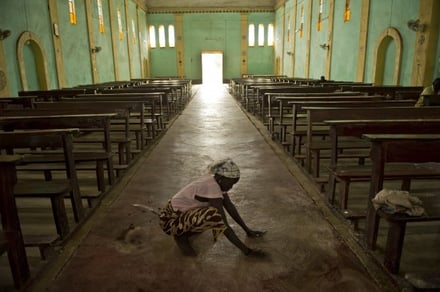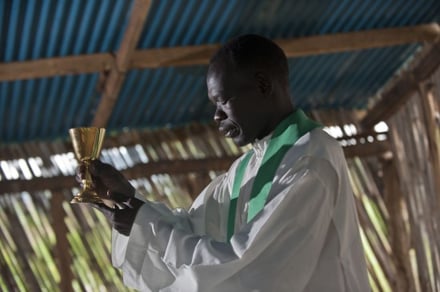A pair of women begin their devotions in the old church 2 hours before Mass. Their reverence is breathtaking. In prolonged genuflection, they scrub the church floor and rustic pews. It would be a slow process with a mop. They use tattered rags.
The floor of the 1919 church building is slate-like and the ceiling, 4 stories above it, metal. The acoustic effect is an echo chamber. In it, the rhythmic swipes of the women's rags resound, recalling ocean waves washing a shoreline.
 Women clean the church floor every Sunday morning before Mass at All Saints Church in Rajef. They scrub the floor by hand and rake the yard with a brush made of sticks. Photo by Karen Kasmauski for CRS.
Women clean the church floor every Sunday morning before Mass at All Saints Church in Rajef. They scrub the floor by hand and rake the yard with a brush made of sticks. Photo by Karen Kasmauski for CRS.
Time and weather have eroded the sandy mortar and faded the orange bricks of All Saints Church. Time, and maybe trouble, has opened holes large enough for birds to enter. They perch along metal rods that brace the heavy iron rafters. At the rear third of the nave of the church, where there are few or no pews, evidence of the birds' occupation stains the floor. No such signs appear where the women scrub.
On hands and knees, their heads bowed to the interminable task of maintaining cleanliness in a house so vulnerable to outside forces, the women offer a persistent, unheralded sacrifice. In their utterly practical, physical defiance of disorder, they embody the role of the Church in southern Sudan.
Given its history, that the Church has persevered in Sudan over half a century of civil war should raise no eyebrows. Her plain wood altars, scarred crosses, even occasional stained glass, remain against all odds, as if emulating Her theology.
Nothing of the core of the Catholic Church is lost or diminished in southern Sudan. Her role as spiritual guide and haven for the downcast, while more visible against the backdrop of absolute poverty, is neither new nor unexpected. But the Church here has taken on, or more accurately has had thrust upon it, another role that maybe shouldn't be all that surprising but is, in fact, nothing short of astonishing.
The Church in southern Sudan is everywhere and in everything.
 Father Joseph Otto, of St. Theresa Parish in Magwi, has been a priest for 9 years, overseeing a circuit of churches over a large area. He says Mass every day even if no one attends. Photo by Karen Kasmauski for CRS.
Father Joseph Otto, of St. Theresa Parish in Magwi, has been a priest for 9 years, overseeing a circuit of churches over a large area. He says Mass every day even if no one attends. Photo by Karen Kasmauski for CRS.
If you could see your Church in southern Sudan, along with all the familiar sights, you would see roads, clinics, wells, civic meetings, microfinance institutions, farms and small business. In short, the material supports of civilization are introduced and maintained here by your Church.
The Church was not elected or selected for this role. Rather, it was the one remaining body capable and credible enough in southern Sudan to bring together and join with all the national and international groups that seek to do good in this place.
Governments were preoccupied by war and unimaginably complex politics. Individuals were preoccupied by day-to-day survival. Traditional forms of conflict resolution between neighbors, tribes, towns and states were shattered over decades of war and upheaval.
Only the Church remained and remains stable enough to defy chaos. Like the women who scrub the floor of All Saints Church, the Catholic Church in southern Sudan bends to the practical tasks of civilization, and struggles to make life not only a bit more bearable, but even possible.
And the Church in Sudan remains vigorous largely on the strength of believers like you. For now and the foreseeable future, civilized life in southern Sudan depends heavily on the Church in Sudan. And the future of that Church increasingly rests in our hands.
If you could see your Church in Sudan, you might be touched by its service, you might be moved by its poverty, you might be challenged by its devotion, but you'd recognize it immediately. After all, it's your Church.
To stay up-to-date on global issues, sign up for Catholic Relief Services' newsletter.
View our World View Wednesday archives
Copyright 2014 Catholic Relief Services
About the Author

Catholic Relief Services
Catholic Relief Services is the official international humanitarian agency of the Catholic community in the United States. We are the official overseas relief and development agency of the U.S. Conference of Catholic Bishops and a member of Caritas International and the National Catholic Development Conference. Find us on Facebook, Twitter, YouTube, Google Plus and Pinterest.



.png?width=1806&height=731&name=CatholicMom_hcfm_logo1_pos_871c_2728c%20(002).png)
Comments